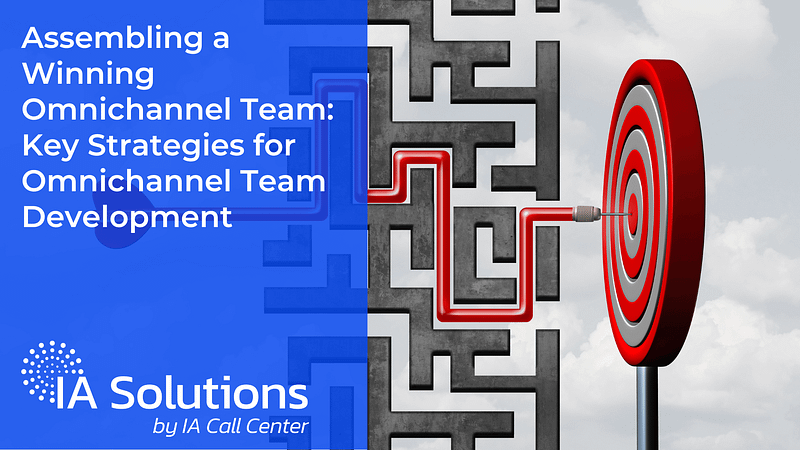Assembling a Winning Omnichannel Team: Key Strategies for Omnichannel Team Development.
(Note: This is the third article in our ten-part series titled “Assembling a Winning Omnichannel Team.” If you missed the last one, “Assembling a Winning Omnichannel Team: Defining Omnichannel Goals and Prerequisites,” you can view it by clicking here. We will post a new article for this series weekly until its completion. Therefore, please check back for more informative posts on this topic.)
Rather listen to the BlogCast for this post instead? Click the “Play” button below to hear it now.
Introduction
In today’s interconnected business world, companies are increasingly adopting the strategy of omnichannel team development to improve customer engagement. Designed specifically for business leaders and executives, this all-inclusive guide explores the benefits of integrating a robust omnichannel approach into customer communication and support systems. The focus of this post is on assembling a team that not only understands the complexities of omnichannel interactions but excels in them.
Omnichannel Team Development extends beyond a multi-channel approach; it encompasses a broader strategy that focuses on seamless integration across all channels. For businesses, this means not only acknowledging the current skills and untapped potential of their teams but also pinpointing crucial areas for training and growth that support their omnichannel objectives.
This series, “Assembling a Winning Omnichannel Team,” covers the strategic aspects of building such a team. Hence, this article examines the significance of evaluating your team’s present abilities, determining their training needs, estimating the necessary time and resources for advancement, and deciding between forming an internal team or seeking external assistance to fulfill your omnichannel objectives.
The Imperative of Omnichannel Team Development
In today’s consumer market, omnichannel communication is not just a luxury but a basic requirement. Businesses are under growing pressure to deliver consistent and efficient service across multiple channels, including social media, email, phone, and face-to-face interactions. Therefore, to stay competitive and meet the changing demands of customers, businesses must make it a priority to develop an omnichannel team.
The positive effects of a well-implemented omnichannel strategy can be seen in the high customer retention rates. According to a Forbes article, companies that excel in omnichannel engagement retain an impressive 89% of their customers, in stark contrast to those with poor omnichannel capabilities who only manage to retain 33%. This stark contrast vividly underscores the crucial importance of implementing omnichannel strategies to maintain customer loyalty and drive business expansion.
The shift from traditional, single-platform customer communication to a more integrated, multi-platform approach emphasizes the importance of developing effective omnichannel teams. The goal is to ensure that customers experience the same high level of service and support, no matter which channel they prefer. Consequently, a successful execution of this requires a team that is not only proficient in various platforms but also capable of harmoniously blending them together to provide a holistic customer experience.
Assessing Your Team’s Current Capabilities
The first step in building an omnichannel team is to carefully evaluate the capabilities of your existing team. By identifying strengths to enhance and gaps to fill, this step becomes pivotal in the overall assessment. The foundation for effective training and development plans lies in having a clear understanding of your team’s skill set.
To evaluate your team’s current performance, consider leveraging tools, such as performance analytics and customer feedback surveys. These tools provide both quantitative and qualitative data, allowing you to gain insights into your team’s management of communication channels and customer interactions. With this data-driven approach, you can effectively target and improve your team’s omnichannel capabilities.
Aligning your team’s skills with your business objectives is something that can make or break your success. By emphasizing customer engagement and satisfaction, it becomes important to ensure that each team member’s skills and roles contribute directly to the company’s objectives. The goal is to form a team that not only has the right skills but also recognizes the interconnection of their roles in the company’s omnichannel strategy.

Training for Omnichannel Excellence
The key to effective omnichannel team development lies in recognizing and teaching the essential skills and competencies. When it comes to omnichannel, this means not only being adept in diverse communication platforms but also grasping how these platforms integrate to amplify the customer’s satisfaction. Therefore, effective training should include instruction on both the technical aspects of handling different channels and the essential soft skills needed to engage with customers effectively across these platforms.
A comprehensive training program is central to preparing your team for the complexities of omnichannel challenges. It involves a comprehensive evaluation of the current proficiency levels in relation to the prerequisites of a well-executed omnichannel approach. The training areas cover everything from technical proficiency in CRM software to developing strong communication and problem-solving skills. This comprehensive approach ensures that the team can handle any type of customer interaction.
The decision between in-house training and external resources greatly affects the development of an omnichannel team. In-house training provides a customized approach that aligns with the specific needs and culture of the company, while external training offers a chance to explore industry-wide practices and the latest techniques. However, the most comprehensive training outcomes often result from a blended approach that incorporates both in-house and external resources.
Sample Training Modules and Timelines
Take, for instance, a training module that centers on CRM software—a vital tool in effectively handling customer interactions across different channels. This module, designed to be completed over a three to four-week period, covers the basics of software navigation, data entry, and analysis techniques. Such a timeline allows for thorough understanding and practical application, essential in omnichannel team development.
Another important module could center on effective communication strategies across various channels, such as social media, email, and live chat. For instance, by dedicating a week to each channel, a comprehensive six-week training program would ensure that team members gain profound expertise and practical skills, enabling them to engage customers proficiently across all mediums.
It is important to set realistic timelines for the completion of these training modules, making it possible for employees to complete them within a reasonable timeframe. By implementing a staggered yet continuous training schedule, your team can gradually acquire new skills and seamlessly apply them in real-life scenarios over several months. By incorporating regular assessments and feedback sessions, there will be ample opportunities to make necessary course corrections and strengthen the learning process.

Time Investment: Preparing Your Team
Investing time in omnichannel team development is critical for guaranteeing its success. Balancing the need for an immediate omnichannel strategy with the time needed to prepare the team is essential. The timeframe for training programs is just part of the equation; there is also a need to consider the time it takes for team members to adjust to new roles and responsibilities within an omnichannel framework.
According to a study by McKinsey & Company, companies that dedicated sufficient time to training and developing their teams for omnichannel strategies experienced a significant 30% rise in customer satisfaction scores. By emphasizing the importance of dedicating sufficient time to team development, this statistic shows the direct connection to improved customer experiences and favorable business outcomes.
Successfully managing the time allocated for omnichannel team development requires a well-thought-out strategy. Setting clear milestones and goals for the training process ensures a structured approach, while monitoring progress allows for tracking improvement along the way. As the team grows in their omnichannel capabilities, this continuous process evolves, making sure that the investment of time pays off in terms of team proficiency and customer satisfaction.
Real-life Examples
Drawing from real-world examples, many of our clients have successfully implemented omnichannel team development strategies. For instance, one of our clients (a retail company) integrated online and in-store customer service teams, training them to provide a unified shopping experience. This approach not only streamlined customer interactions, but also enhanced overall satisfaction.
In the case of a telecommunications client, omnichannel team development involved cross-training support staff across various channels like phone, email, and social media. This strategy helped to reduce response times and improve resolution rates, as evidenced by a 20% decrease in customer complaints.
These clients’ success directly resulted from effective time management during the development phase, which played a crucial role. These clients set realistic timelines and benchmarks, which eased the transition into omnichannel roles for their teams. This strategic time management led to a team that was more efficient and skilled in managing the complexities of omnichannel communication.
In-House vs Outsourced: Making the Right Choice
Deciding between developing an in-house team or outsourcing for omnichannel team development is a critical decision for your business. Both options come with their own set of advantages and challenges. For instance, in-house development allows for greater control and alignment with your company culture, while outsourcing can provide access to specialized skills and technology.
Apart from that, you must also consider other factors, including cost, control, expertise, and scalability. A survey conducted by Deloitte found that 59% of businesses opt for outsourcing as a cost-cutting measure. Nevertheless, it is imperative to emphasize the significance of implementing quality control measures and seamlessly blending outsourced services into current company protocols. Ultimately, the choice will vary based on the unique needs and resources of the business.
Aligning the team structure choice with business objectives is another crucial element. For instance, if your company has a particularly strong focus on personalized customer service, you might prefer an in-house team to maintain control over customer interactions. Conversely, if your business is seeking rapid scalability, opting for an outsourced solution could help to quickly adapt to changing market demands.
Industry Insights
When discussing the choice between in-house and outsourcing, industry experts consistently stress the need for alignment with a company’s long-term strategic goals. Choosing the right approach can greatly influence the effectiveness of omnichannel strategies and the overall customer experience.
Many case studies in various industries highlight the decision-making process and outcomes of this all-important choice. For instance, a boutique retail company might choose in-house development to closely integrate online and offline customer experiences, whereas a growing tech company might outsource to leverage specialized skills and innovative technologies.
The key to success lies in ensuring that your team is adequately equipped and in harmony with the company’s omnichannel goals, regardless of the path you take. The success of your omnichannel strategy hinges on this type of alignment, which allows the team to engage seamlessly with customers across all touchpoints.

Preparing for Omnichannel Implementation
When businesses approach the implementation of their omnichannel strategy, they must meticulously plan the initial steps to ensure success. This critical preparation phase helps ensure the team is not only ready but also aligned with the strategic objectives of the omnichannel initiative. It involves seamlessly blending new skills and processes into the day-to-day operations of the business.
Preparing for omnichannel implementation involves creating open lines of communication among the team, establishing the required technological infrastructure, and ensuring everyone knows their roles and responsibilities. This preparation lays the foundation for a seamless shift towards a successful omnichannel operation.
Having a clear and detailed strategic roadmap is a key component in the implementation process. This roadmap should clearly highlight the key milestones, anticipate any potential obstacles, and provide a definitive path for the team. Like a compass, the roadmap serves as a guide, directing the team through the intricate process of implementing an omnichannel strategy, which ensures that all efforts are synchronized with the desired outcomes.
Actionable Insights and Tips
Practical tips and guidance are priceless for businesses about to embark on omnichannel team implementation. One practical suggestion is to begin with a trial run, implementing the omnichannel strategy in a pilot program before implementing it on a larger scale. This allows for early identification and rectification of any issues that may arise during the process.
Another important tip is to make sure that the team receives ongoing training and development. As omnichannel platforms and customer expectations continue to change, the team must continuously update their skills and knowledge. Regular training sessions and workshops can help keep the team up-to-date and agile in their approach.
To ensure optimal performance, it is essential to employ tools and technologies for monitoring and assessment. By utilizing analytics tools, your business can gain valuable insights into customer interactions across various channels, enabling you to pinpoint areas in need of improvement and evaluate the effectiveness of your omnichannel approach. These tools are crucial for refining the implementation and guaranteeing its success.
Conclusion
In summary, assembling a winning omnichannel team requires careful planning, strategic training, and a clear understanding of your team’s capabilities – it’s a multifaceted journey. This article has provided a comprehensive guide on the essential steps and factors to consider for successful omnichannel team development, which is crucial in today’s customer-focused business landscape.
Each step, from assessing your current team’s capabilities to deciding between in-house and outsourced solutions, contributes significantly to creating a team that can effectively handle the intricacies of omnichannel communication. The ultimate aim is to build a team that not only satisfies but surpasses customers’ growing expectations through different channels.
The insights and strategies discussed here are like a roadmap, leading business owners and executives on a journey to build a team that is fully equipped and prepared to navigate the complexities of omnichannel communication. By adopting the right approach, your team can become a driving force in reaching your omnichannel objectives.

Summary
The article explores key aspects of omnichannel team development, emphasizing the need for a strategic approach in building a team skilled in handling various communication channels. The evaluation of current team skills, identification of training needs, and consideration of in-house versus outsourced teams have been the focus.
We also explored the significance of training and time investment in preparing a team for omnichannel success. Using real-world examples and data, we illustrated the impact of these strategies on customer retention and satisfaction, underscoring the importance of a well-prepared team in the omnichannel landscape.
We also discussed how the decision-making process between in-house and outsourced solutions, along with the preparation for omnichannel implementation, are critical steps in this journey. We showed how these decisions must align with the company’s overall omnichannel goals to ensure a seamless and effective customer experience across all channels.
Partnering with IA Solutions
For businesses aiming to achieve their omnichannel goals, teaming up with IA Solutions, a seasoned and specialized provider, can make a significant difference. With their extensive 50-year track record, IA Solutions excels at customizing their services to cater to the specific requirements of companies, regardless of their size or industry.
With IA Solutions, you gain access to a treasure trove of knowledge and expertise in omnichannel team development. From training and development programs to comprehensive outsourcing solutions, our services cover a wide range of offerings. Our experience in this field ensures your business can leverage the full potential of your omnichannel strategies, enhancing customer engagement and satisfaction.
If your business is looking to optimize its omnichannel communication and support systems, IA Solutions offers a comprehensive suite of services to meet those needs. By partnering with IA Solutions, your company can ensure that your omnichannel teams are not only well-prepared but also continuously supported to adapt and thrive in the ever-changing landscape of customer communication.
If you’re ready to start your company’s omnichannel journey, we invite you to contact us to schedule a no-cost, no-obligation consultation. You can reach us by phone at 1-888-631-9711 or by email at [email protected]. We look forward to hearing from you.
Coming Up Next
In the next part of this series, we will focus on searching for and choosing an omnichannel partner or provider. This crucial phase moves beyond preparation and into starting to actually put the strategy into action, which is a process that brings its own set of challenges and opportunities.
We will explore the key elements involved in choosing the right partner, such as due diligence, defining expectations, and determining if a potential partner or provider is a good match for your business. These elements are critical in ensuring a successful and effective omnichannel operation.
The upcoming article will also provide a sneak peek into the potential hurdles businesses may face during the partner selection process and how to overcome them. Stay tuned for practical insights and tips that will help you navigate the complexities of bringing your omnichannel strategy to life.















